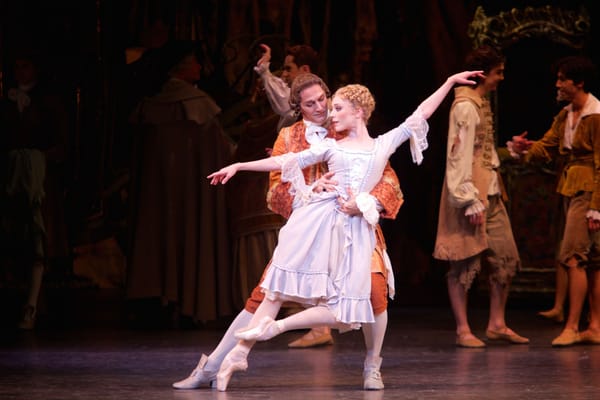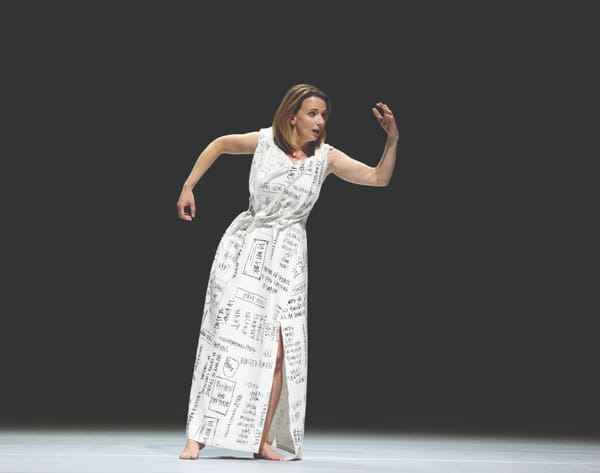Me too in Mount Olympus
Orpheus in the Underworld is a hilarious account of bored gods abusing the mortal world

4.5 stars
Jacques Offenbach composed his world-famous operetta Orphée aux enfers in late 19th century France, satirizing the society of his time, the ruling classes and their vices. Now, in the second opera of this season’s ENO’s Orpheus Series, director Emma Rice adapts this comic masterpiece to our times, bringing current topics to the mythological world. It isn’t that different from the original - human nature hasn’t changed that much. Instead, Rice changes the point of view, adding depth to our perception of the characters’ complex inner lives.
In Offenbach’s version, Orpheus hates his wife and constantly says so, embarking on a rescue mission just because Public Opinion (yes, that’s a character) compels him to. Apparently that was funny at the time… Rice adds a backstory during the orchestral overture and shifts the narrative to that of a couple broken by tragedy in a path to forgiveness and reunion, restoring Orpheus (played by Ed Lyon) to his traditional role of a romantic hero. Public Opinion (portrayed by Lucia Lucas) is still there, helping him and driving/flying an actual black London cab. Other significant changes are that Eurydice (played by Mary Bevan) is now a victim of the abuse of the gods who take advantage of her trauma, instead of a mere prop being tossed around; and Jupiter (portrayed by Willard White) is a powerful bastard who always gets away with sexual assault and is despised by every other god. Bevan deserves a shout out for her first-rate singing and clear, bright voice. It really makes us sympathise with the character, all the way from the discussions with her husband to the frenzy dance of the final act.
The show has a lukewarm start, with a lengthy spoken introduction that delays the start of the music, but rapidly warms up with a ridiculously funny chorus of sheep and bees. Pluto (played by Alex Otterburn), a very good flirt with a terrible evil laugh, seduces a despair-driven Eurydice and tricks Orpheus into killing her. The scene then changes to Mount Olympus, a luxurious white-tilled vacation complex, and from then on it’s strong, quality fun until the end. We see the gods accusing Jupiter of being an incorrigible sexual predator, condemning his actions because ‘love is only lovely when the loved one agrees’. The topic of abuse recurs, with the god of gods turning into a fly to seduce Eurydice in a hilarious scene whose great protagonist is someone waving a stick with a giant “fly” at the tip. Then she is assaulted by John Styx (portrayed by Alan Oke), Bacchus and Pluto again. It is definitely not fun to be Eurydice in this story.
Originally in French, the libretto was freely translated to English for this production. The best thing about it is that it allows itself enough creative freedom to bring humour that suits the modern taste, without drifting from the main topics. It is also incredibly witty, and many a time did the audience laugh out loud. It isn’t every day that you hear someone singing ‘Shit, he’s coming’ in an extremely operatic voice.
The dance numbers are also incredibly energetic, and at times touching upon the ridiculous, in a parody to excess. Colourful sets and a very active chorus add extra layers of action to the stage. A particularly good example is the final of act two: the clouds are made of giant balloons, people wear balloon tutus and the lights alternate between all primary colours. All in an exuberant celebration of the decision that the gods ‘are going to follow god [Jupiter] to hell.’ It can only be a good idea because, as they put it, the secret to a good life is to ‘chose a good leader and follow them everywhere’. The climactic scene of the final, that Offenbach called “galop infernal” but is known as the music for the cabaret dance “can-can”, hits just the right amount of tragedy and sordid appeal. Set in a horrendous peep show in the underworld, there is a stark contrast between the glamour of the costumes and Eurydice’s terrible words, all observed at a distance by keen males with binoculars. Fated to remain in the Underworld serving Bacchus, her only alternative is to ‘embrace the frenzy and the pain until the mad becomes the sane’.
With catchy tunes, stunning sets and great performances, Orpheus in the Underworld promises to become a great night out - funny, appealing and deeply rooted in today’s world.









